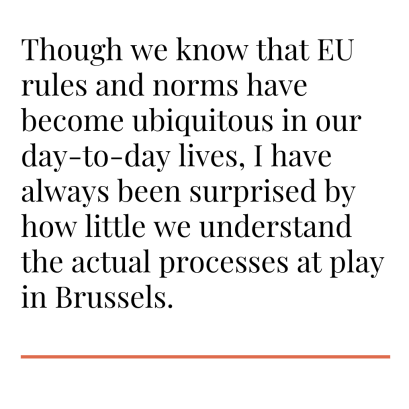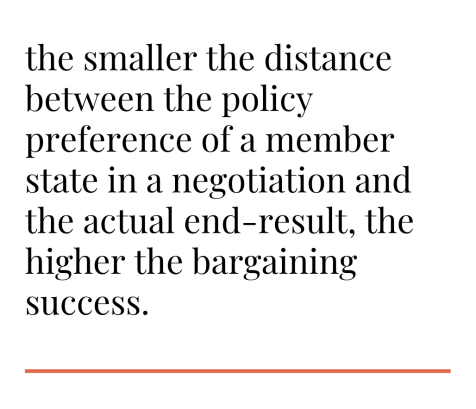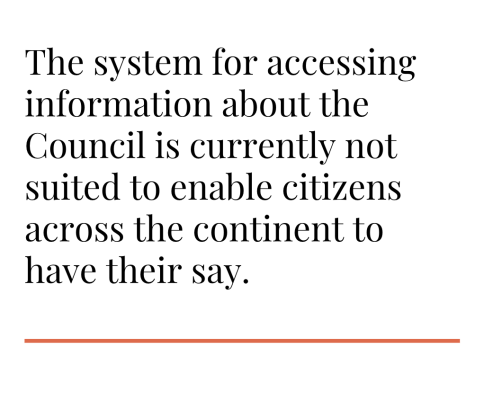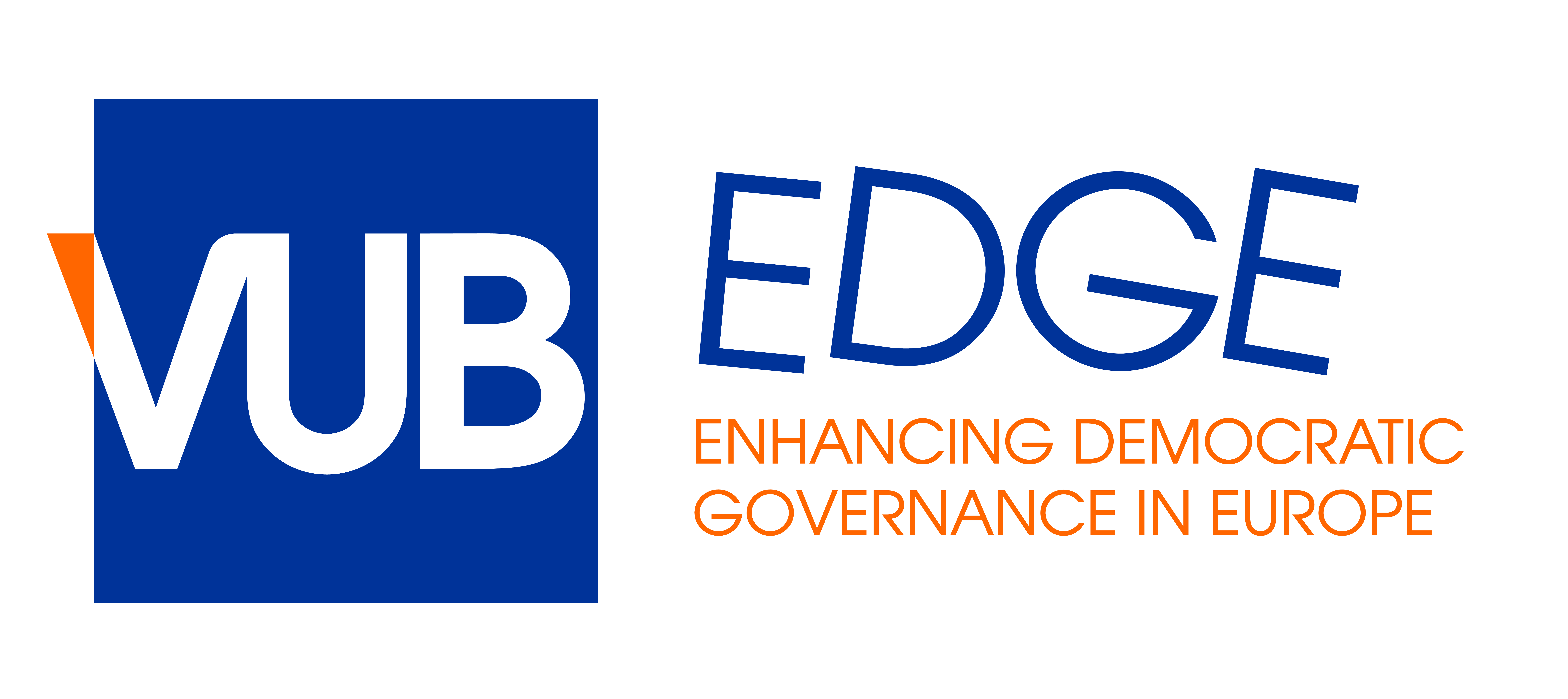
Dr. Trisha Meyer in conversation with Clément Perarnaud
Trisha Meyer: Below is a discussion of Clément Perarnaud’s research. Clément Perarnaud is a doctoral researcher at Universitat Pompeu Fabra - Barcelona, and a visiting fellow at the Institute for European Studies - Vrije Universiteit Brussel. In his most recent research, Clément aims to provide a refined understanding of member states’ bargaining success in shaping EU digital policies. In particular, he sheds light on the role of coalitions and individual negotiators’ capacities and resources in explaining member states’ ability to successfully influence the outcome of digital policies in the Council of the EU. Clément presented his research in an EDGE Seminar on 17 June 2020. We sat down (virtually) afterwards to reflect on his personal journey, doctoral project, and contribution to evaluating democratic governance in Europe.
CLEMENT PERARNAUD
Trisha Meyer (TM): Could you tell us a little about your background? Who are you and where did you grow up?
Clément Perarnaud (CP): I have been a PhD student at the University Pompeu Fabra for four years now, working on a research project focused on the power of member states in the context of EU negotiations. I come from the beautiful region of Limousin in France and now live in Brussels for my visiting stay at the IES, after having been a regular guest to the city in the past years as part of my research fieldwork.
TM: Who or what inspired you to pursue a PhD?
CP: Before joining the PhD programme at UPF, I had worked for two research centres - the Centre for International Studies and Research (CERI – Sciences Po) in Paris, and the Research Institute on Contemporary Maghreb (IRMC) in Tunis. Working alongside young and established researchers in these different work contexts, I progressively learned to appreciate the unique chance of being able to concentrate on one’s area of interest and the relative (and often challenging) freedom that comes with it.
TM: France, Tunisia, Spain and now Belgium. That’s a very nice trajectory! How did you end up focusing your research on the EU and on Council decision-making in particular?
CP: My interest in the EU is not really new, and comes back to my university studies during which I specialised on EU affairs. Though we know that EU rules and norms have become ubiquitous in our day-to-day lives, I have always been surprised by how little we understand the actual processes at play in Brussels.

Initially, I intended my research project to be primarily focused on the influence of interest groups on EU legislation related to digital affairs. While developing my research project, I eventually joined a broader research programme on the power of member states in European policy-making funded by the Spanish Ministry of Economy and then chose to look at the same policy dynamics but from the perspectives of member states. For me, the Council was always this rather obscure yet highly powerful body of the EU, and I find myself lucky to have had the opportunity to explore it over the years of my PhD research.
COUNCIL NEGOTIATIONS ON DIGITAL POLICY
TM: Thanks for sharing some of your personal journey with us. Let’s turn to your latest research. What is your main argument in the article?
CP: The objective of this paper is to try to uncover the role of member states’ permanent representations in understanding the shaping process of European policies related to the Digital Single Market. Each member state has a permanent representation in Brussels responsible for gathering information for its ministries in the capital and advancing national interests during negotiations at the EU level. But all member states are not equal when it comes to their capacity to formulate their positions, update them throughout the negotiation process, and defend them in Brussels. Some member states are known for the efficiency of their mechanisms allowing them to act very early in the Council, while others appear characterised by more cumbersome structures and fewer resources. This paper explores to which extent variations of these ‘Brussels-based’ resources can influence the outcome of negotiations in the Council.
TM: In the article, you speak of member states’ ‘bargaining success’. What do you mean and could you illustrate this with an example from your case studies on EU digital policy?
CP: In the literature, to which this paper contributes, bargaining success is usually defined as the capacity of actors to obtain a decision outcome that closely reflects their policy preferences in the context of negotiations.

In other words, the smaller the distance between the policy preference of a member state in a negotiation and the actual end-result, the higher the bargaining success. As an illustration, I can refer to the adoption process of the EU regulation on the free flow of data in 2018, which is an interesting and rather counterintuitive case. During this specific negotiation, France and Germany appeared outmanoeuvred by a range of member states, who supported the creation of a more integrated internal market for data storage at the European level, despite the concerns forcefully expressed by France and Germany prior to and during the negotiation process. In the article, I further explain how this ‘success’ of small member states relates in part to the strategy they developed as part of an informal coalition group (‘the digital like-minded group’) gathering a number of Brussels-based negotiators, to first maintain this proposal on the agenda of the Commission and then derail competing political dynamics in the Council.
TM: So in this case study, coordination among Brussels-based negotiators helps explain why big member states who had an outspoken view did not succeed during the Council negotiations. What would you consider the implications for digital policy-making in the EU?
CP: As suggested by the previous example (and the two other case studies of the paper), it appears that the processes at play in Brussels, and in particular the individual capacities of negotiators and the way they coordinate with their capital and counterparts in Brussels, can have a significant impact on how digital policies are shaped. My research suggests in particular that strong, yet informal, coordination mechanisms between the most digitally advanced countries of the EU have granted them significant influence over other member states in the past years. However, it should be emphasised that the policy preferences of the most digital advanced member states (such as Sweden, Denmark and the Netherlands) are not homogeneous on all policy issues, as also shown by the recent negotiations on the geo-blocking regulation or the copyright directive.
TM: Alright, so the policy-making process for the Digital Services Act is in its starting blocks. This will be a controversial file, as it tackles the responsibilities of internet platforms. Have you observed similar coalitions and/or tactics within the Council being deployed already?
CP: We are still in the early days of the discussions on the future Digital Services Act (DSA), but it is clear that this file is already a high priority for most member states in the Council. The results of the ongoing public consultation launched by the Commission will soon give us more clarity on the positions of all stakeholders. But I would expect that most governments are already trying to engage thoroughly with the various parts of the Commission responsible for the formulation of the policy proposal, as it has been the case in past high-stakes negotiations, such as the copyright directive or the Audiovisual Media Services (AVMS) directive. Given that member states have already been debating extensively on the policy issues raised by the DSA over the past years, I would also expect that the channels they have established to coordinate their positions and strategies may be reactivated for this new battle on the liability and responsibility of internet platforms.
EVALUATING DEMOCRATIC GOVERNANCE IN EUROPE
TM: Another case to follow closely! Let me throw you the perennial question: why do you think we should be interested in your research? What lasting academic contribution do you hope to make?
CP: I don’t know what will be the real value of my contribution eventually, but my objective is to contribute to the literature on bargaining success by laying the emphasis on the actual role of negotiation processes and their actors for understanding decision outcomes. Who are the negotiators? What is their role, and what are the resources provided by the capital to perform these tasks? These questions often remain unanswered, due to the veil of secrecy surrounding the work of the Council, and more generally the world of diplomacy.
TM: Indeed, decision-making in the Council of the EU has often been referred to as a ‘black box’, as it is very difficult to influence and understand how decisions are made. In parallel, there is a distrust of traditional politics. How do you think the Council of the EU can play a role in countering this distrust in politics?
CP: The reform of the Council's transparency practices is under discussion at the moment, partly thanks to earlier actions taken by the EU Ombudsman and civil society groups. Having studied Council policymaking processes over the past years, I can confirm that a lot of work remains to be done in explaining how decisions are taken, but even more importantly in publicising these debates. The opacity of the Council inevitably amplifies citizens’ distrust in the EU institutional system, and advantages only a range of actors with the sufficient capacity and inner-knowledge to engage with these policymaking processes. The system for accessing information about the Council is currently not suited to enable citizens across the continent to have their say, or even simply learn, about the topics discussed by their own ministers at the EU level.

TM: Finally, we are holding this conversation for the EDGE Blog. How do your findings deepen our understanding of democratic governance in Europe?
CP: Looking at negotiations in the Council of the EU reveals the processes by which policy positions are defended by governments at the European level. Analysing patterns in the decision-making process of the Council, but also in how member states engage with the European Parliament as part of the legislative process, has direct repercussions for debates on what is the actual Parliament’s legislative role after the Lisbon Treaty and on the broader inter-institutional power balance of the EU, and thus on our understanding of democratic governance at the EU level.
TM: I look forward to continuing these exchanges during the remainder of your visiting fellowship at the Vrije Universiteit Brussel -- through January 2021. Many thanks!

Add new comment